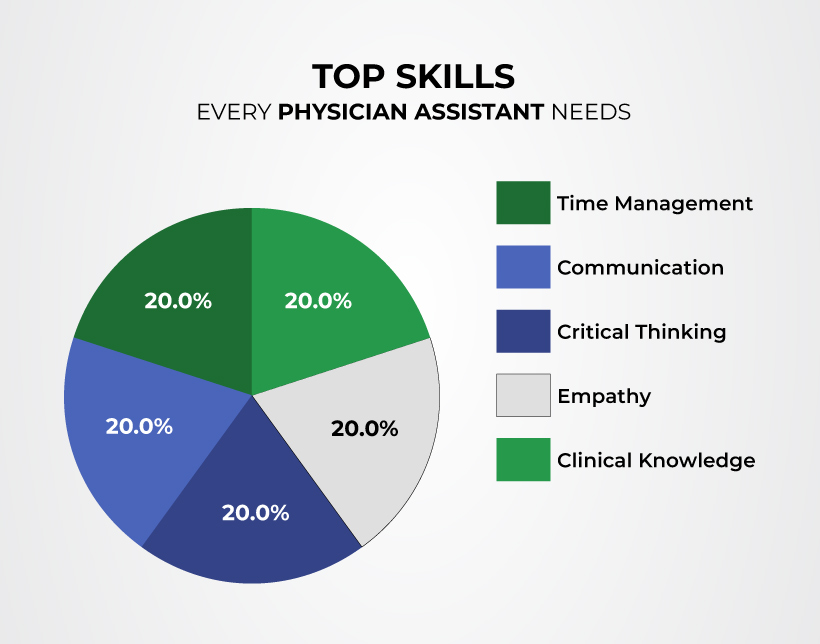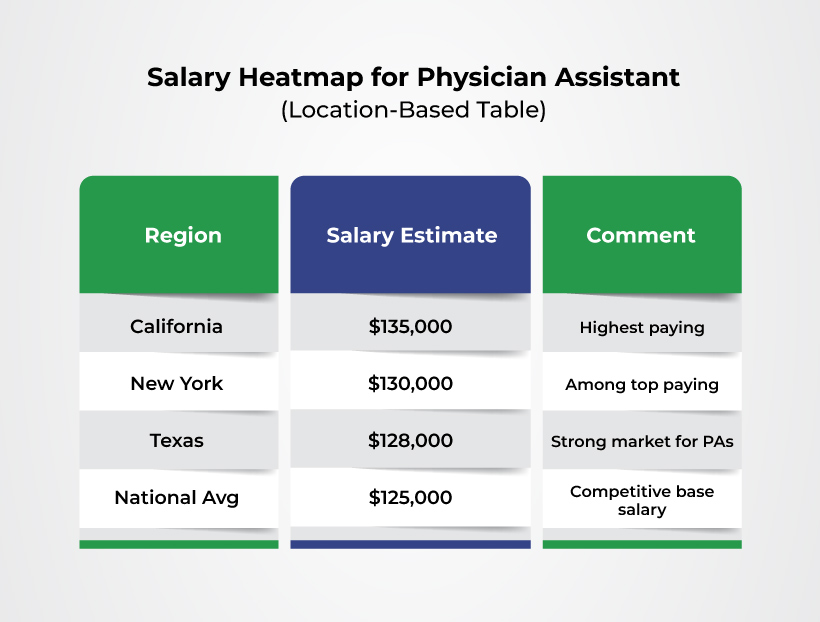The healthcare industry in the USA is growing rapidly, and many roles now support doctors in patient care. One of the most important is the Physician Assistant (PA).

Becoming a Physician Assistant (PA) is a fulfilling career choice. You’ll directly help patients, assist doctors, and make a real difference in medical care. If you are a student or transitioning into a career, this blog post outlines the steps to becoming a Physician Assistant.
We will guide you through the entire process, from education to job placement.
Evolution of the Physician Assistant Profession
The Physician Assistant (PA) profession started in the 1960s to meet the growing need for healthcare providers. The first PA training program started at Duke University, led by Dr. Eugene Stead. He selected Navy corpsmen who had received medical training during their service, aiming to repurpose their skills for civilian healthcare roles.
The program’s success demonstrated that highly trained healthcare professionals could support physicians and expand access to quality care. As the healthcare system evolved, so did the PA role, expanding into specialties like surgery, emergency medicine, and pediatrics. Over time, the demand for PAs has steadily increased. Today, PAs help bridge gaps in patient care and continually improve patient outcomes.
What is a Physician Assistant?
A Physician Assistant, also known as a Physician Associate, PAs or PA-C (Physician Assistant-Certified), is a licensed medical care expert trained to evaluate patients, assist in diagnosing illnesses, contribute to treatment planning, and perform certain medical procedures under the supervision of a physician. They work in clinics, hospitals, and other medical facilities. Physician Associates (PAs) work under the guidance of a physician, but they often operate independently within their scope of practice. They can examine patients, order tests, interpret results, and assist in surgeries, all while collaborating with a medical team.
Step-by-Step Process to Become a Physician Assistant
Becoming a Physician Assistant (PA) in the USA is a well-defined journey that requires focused education, experience, and certification. Here’s a clear, step-by-step manual on how to pursue this rewarding career in healthcare.

Earn a Bachelor’s Degree in a Relevant Field
The first step in becoming a Physician Assistant is earning a bachelor’s degree. Choose a science-related field such as health sciences, biology, or chemistry, as these subjects are the foundation for PA program coursework. Most Physician Assistant Schools require a strong background in:
- Biology
- Chemistry
- Anatomy
- Psychology
- Physiology
- Microbiology
- Medical Terminology
- Statistics or Biostatistics
- Genetics
- Sociology (sometimes)
Some schools may also expect experience in healthcare-related ethics, nutrition, or pathophysiology, depending on the program. Aim for a GPA of at least 3.0 to qualify for PA Program Admissions.
Gain Practical Healthcare Experience
Physician Associate programs require you to gain practical clinical experience. Most schools require students to complete anywhere from 1,000 to 3,000 hours of hands-on patient care. Here are some common jobs where you can gain this valuable experience:
- Medical assistant
- EMT (Emergency Medical Technician)
- Nursing Assistant
- Phlebotomist
- ER technician
These roles build your confidence and practical skills.
Apply to the ARC-PA Program
Next, you must apply to a program accredited by the Accreditation Review Commission on Education for the Physician Assistant (ARC-PA), the official accrediting body in the United States. Programs typically take 2 to 3 years and include coursework in:
- Pathophysiology
- Clinical Medicine
- Pharmacology
- Medical Ethics
Clinical rotations help you apply what you’ve learned in real-world settings. You’ll apply through the Central Application Service for Physician Assistants (CASPA, the primary portal for most PA programs in the U.S.).
According to the study, students gain knowledge effectively through both problem-based and lecture-based teaching methods. This proves that different learning approaches in PA programs can be equally successful.
Pass the PANCE Exam
After completing your degree, you must pass the Physician Assistant National Certifying Exam (PANCE) in the United States. The test is the National Commission on Certification of Physician Assistants (NCCPA). The PANCE exam covers fundamental areas such as
- Patient Assessments
- Medical and Surgical Knowledge
- Diagnosis and Treatment
Successfully passing the PANCE will grant you the PA-C (Physician Assistant-Certified) credential, a requirement for PA practice in the USA.
Get State Licensure to Practice
After passing the PANCE, you need to obtain a state license to practice as a Physician Assistant. Each state sets its own licensing rules, but most commonly requires
- A degree from an accredited PA program
- A passing PANCE score
- Background checks and licensing fees
Check with your state’s medical board for details.
Ongoing Certification Requirements for Physician Assistants
Once you’re certified and licensed, you must maintain your Physician Assistant (PA) certification. This involves completing 100 hours of Continuing Medical Education (CME) every two years. Additionally, every 10 years, you’ll need to take and pass the Physician Assistant National Recertifying Exam (PANRE) in the United States to ensure your knowledge stays current.
How Long Does It Take to Become a Physician Assistant?
The process to become a Physician Assistant (PA) typically takes 6 to 7 years, broken down as follows:
- 4 years for a Bachelor’s degree in a relevant field (such as health sciences or biology)
- 1 to 2 years of hands-on clinical experience, which is required to apply to a PA-C (Physician Assistant-Certified) Program
- 2 to 3 years to complete a PA program accredited by the Accreditation Review Commission on Education for the Physician Assistant (ARC-PA)
This path is shorter than becoming a doctor, yet it offers profound professional fulfillment and transformative influence in patient care.
Why Choose a Career as a Physician Assistant?
There are many reasons to pursue a career as a Physician Associate (PA):
- Physician assistants (PAs) are in high demand in medical care. This rapidly growing field offers job security.
- They earn a competitive salary, as well as opportunities to increase earnings through specialization and experience.
- Physician assistants (PAs) have flexible work environments; they work in various medical centers like clinics, hospitals and private practices.
- Becoming a PA takes less time than medical school, which allows a quicker entry into the workforce.
- PAs can pursue locum tenens work for professional variety and travel.
Skills You Need to Succeed as a Physician Assistant
To excel as a Physician Assistant (PA), you need a combination of technical and interpersonal skills. These skills are necessary for delivering high-quality patient care and building trust in a medical care setting. Here are the core abilities for this clinical expertise:
- Effective communication
- Strong critical thinking
- Empathy and compassion
- Good time management
- In-depth clinical knowledge
In the U.S., PA-C (Physician Assistant-Certified) must complete continuing medical education (CME) and pass periodic recertification exams to stay current with evolving medical practices. This commitment to ongoing learning improves clinical expertise, equips PAs to manage complex patient cases safely, and promotes a fulfilling, patient-centered career.
Want to know how locum tenens roles compensate a Physician Assistant?
Recommended Read: Do Staffing Agencies Pay You?
Where Do PAs Work?
Physician Assistants work in diverse settings:
- Hospitals
- Private Clinics
- Urgent Care Centers
- Government Agencies
- Educational Institutions
Job Outlook and Salary for Physician Assistants
The job prospects for Physician Assistants (PAs) are highly promising. According to the study, the median annual salary for a PA in the U.S. is over $125,000, with the potential for higher earnings based on experience and specialization.

The top-paying states include
- California
- New York
- Texas
- Washington
As healthcare services continue to grow, so does the need for qualified Physician Assistants (PAs). This increasing demand creates a wealth of opportunities for PAs to find rewarding roles across the country. That’s why agencies like Imperial Locum provide top-tier medical staffing solutions for facilities in urgent need.
How Health Staffing Agencies Can Help Physician Assistants?
When you’re ready to work, choose trusted medical staffing solutions. A good partner helps with:
- Locum Tenens roles
- Permanent placement
- Credentialing and Compliance
- Career Coaching
Imperial Locum offers reliable medical staffing solutions for Physician Assistants. Their vast network and personalized approach make job placement a simple process. Additionally, Imperial Locum ensures that you are well-prepared to provide top-tier patient care through proper credentialing, training, and ongoing support in your clinical roles.
Suggested Reading: Is it Beneficial to Use a Staffing Agency?
Final Thoughts
Becoming a Physician Assistant is a rewarding and impactful career choice. PAs are necessary to the healthcare system, collaborating with physicians and patients to provide top-quality care. With a structured education process and hands-on clinical experience, becoming a Physician Assistant (PA) offers multiple benefits, including job stability, a competitive salary, and the ability to work in diverse settings. The demand for Physician Assistants is rapidly increasing, and with the right training, you can make a significant difference in healthcare.
This career offers purpose, flexibility, and growth. It also provides an excellent opportunity to work with a team of individuals who work tirelessly to deliver patient care. Contact our team to explore more Locum Tenens jobs in the United States.
Frequently Asked Questions (FAQs)
1. How much does a physician assistant earn?
Physician assistants (PAs) earn an average annual salary of approximately $120,000 in the United States, although this figure may vary depending on location and experience.
2. Is becoming a Physician Assistant easier than becoming a doctor?
Yes, it’s true. The Physician Assistant is shorter, takes a few years, and is less costly than becoming a doctor. However, it still requires dedication and hard work.
3. Is it beneficial to work with a staffing agency as a physician assistant?
Yes, working with a staffing agency can offer multiple benefits for Physician Assistants, including access to locum tenens opportunities, higher flexibility in job placement, and assistance with credentialing and compliance.
4. Can physician assistants assist in surgery?
Yes, many physician assistants (PAs) assist in surgeries. Some even work full-time in surgical teams. They help with prep, procedures, and recovery.
5. What’s the difference between a PA and a nurse practitioner?
Both Physician Assistants (PAs) and Nurse Practitioners (NPs) are advanced healthcare professionals, but they differ in training and approach. Physician Assistants are educated under the medical model, similar to physicians, while Nurse Practitioners follow the nursing model, emphasizing patient-centered care.
6. Do physician assistants need a medical degree?
No, they don’t. Instead, they earn a Master’s degree in Physician Assistant (PA) studies.
7. Are physician assistants allowed to write prescriptions?
Yes, Physician Assistants (PAs) are authorized to prescribe medications in all 50 U.S. states, the District of Columbia, and U.S. territories. This includes both controlled and non-controlled substances, though the extent of their prescribing authority varies by state law and scope of supervision.

